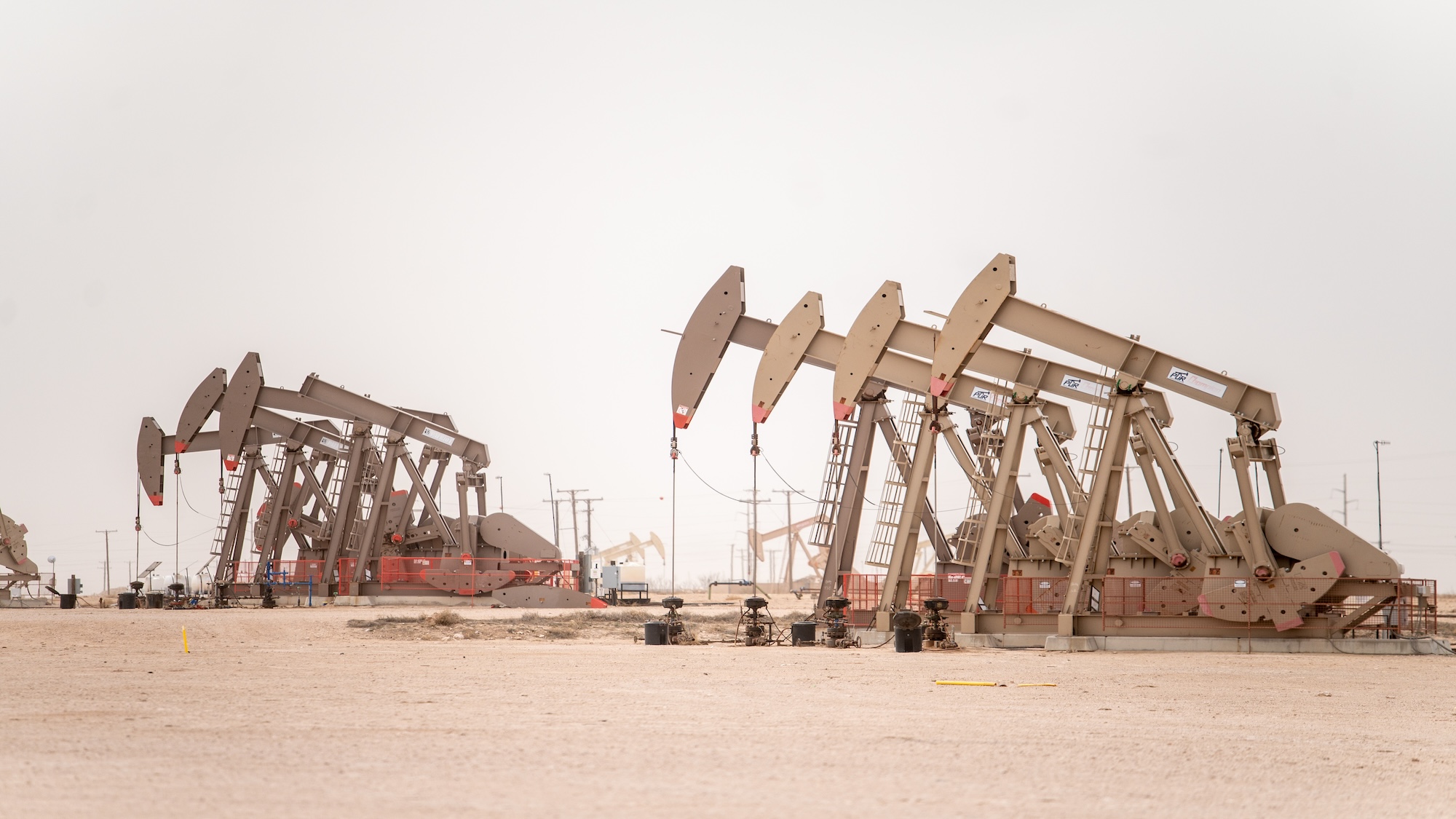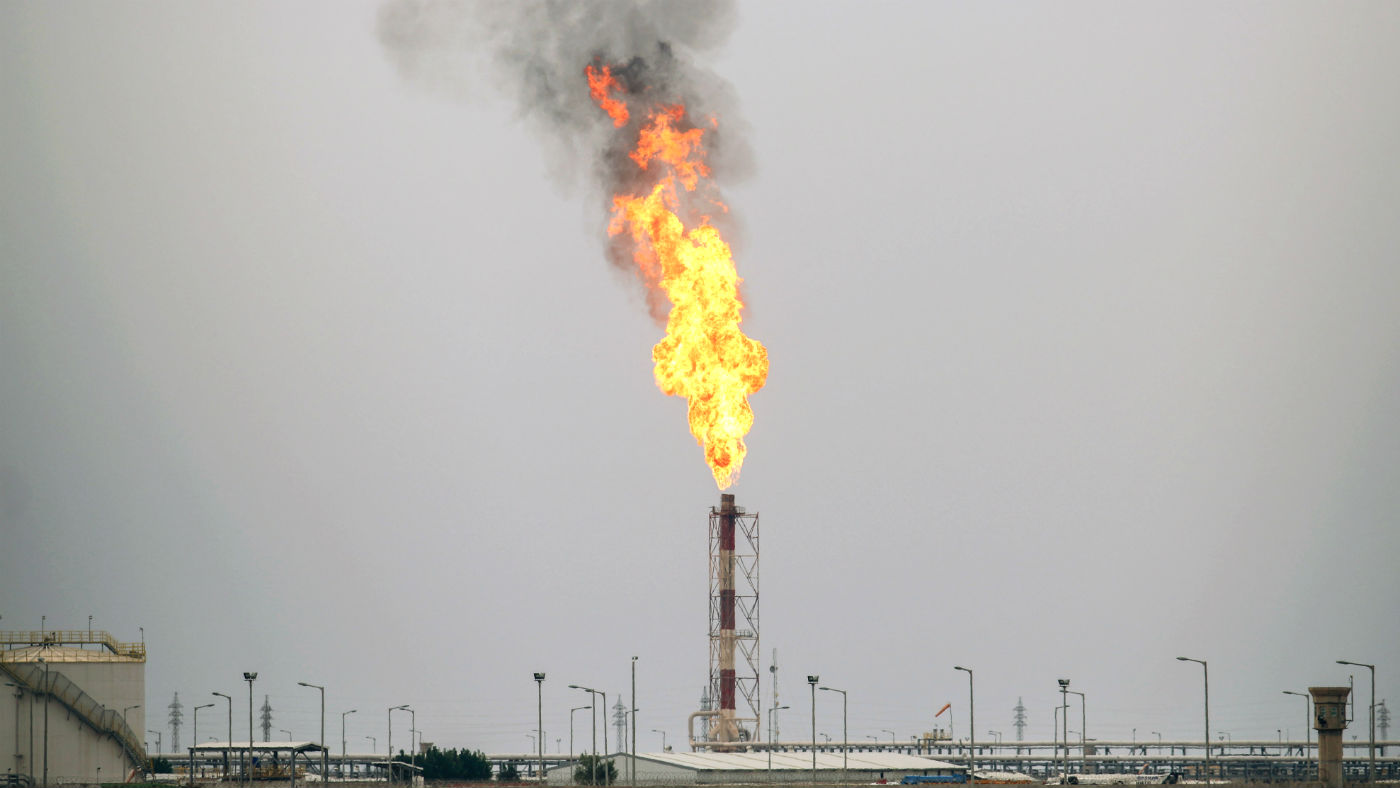Oil price posts two-year highs - but how long can it last?
Brent rose above $59 a barrel this week, its best third-quarter showing since 2004

A free daily email with the biggest news stories of the day – and the best features from TheWeek.com
You are now subscribed
Your newsletter sign-up was successful
Oil’s long-neglected bulls finally had reason for cheer this week, after Brent crude prices lurched to two-year highs.
Benchmark Brent rose above $59 a barrel this week, although by Friday it had slipped back to $57.58 amid profit taking.
Still, that was the fifth consecutive weekly gain, and Brent’s best third-quarter performance since 2004, Reuters says. Already some analysts are calling oil at $80, according to CNBC.
The Week
Escape your echo chamber. Get the facts behind the news, plus analysis from multiple perspectives.

Sign up for The Week's Free Newsletters
From our morning news briefing to a weekly Good News Newsletter, get the best of The Week delivered directly to your inbox.
From our morning news briefing to a weekly Good News Newsletter, get the best of The Week delivered directly to your inbox.
The rise was in part a response to Turkey’s threat to cut off Kurdish oil exports, after the Kurds voted overwhelmingly for independence. Kurdistan produces just over 600,000 bpd, or about 15 percent of Iraq’s total output.
But Brent prices “have only moved up into the upper-$50s because the underlying fundamentals have improved markedly in the last few months,” Oil Price says. Rising demand and flatlining global supplies, coupled with OPEC’s cuts since January, seem to be finally putting upward pressure on the commodity after three years in the doldrums.
Still, OPEC shouldn’t jump the gun by declaring victory, one expert told CNBC. The third quarter is typically when demand is strongest, and shale oil producers may well respond to the upward trend by ramping up supply even further. OPEC members themselves might also be tempted to capitalise on the new environment, which would quickly depress prices again.
OPEC and others have cut production by 1.8 million barrels per day, but U.S. shale producers have not held back. Their output is set to rise for a tenth month in a row in October, Reuters reports.
A free daily email with the biggest news stories of the day – and the best features from TheWeek.com
Oil price: WTI steady as Brent rises on hopes of Saudi output cut
8 September
The price of oil was flat in New York today, as Hurricane Irma approached the US, but rose in London, where news of a production cut led to optimism.
At 2.39pm today, West Texas Intermediate (WTI) was fetching $49.04 a barrel in the US, down five cents on its previous closing price. In London, Brent Crude was up 25 cents at $54.74.
Irma will be the second major hurricane to hit the US coast in a fortnight when it makes landfall on Florida some time between now and Sunday. Hurricane Harvey, which struck further west in Texas, shut down one quarter of US oil refining capacity.
With fewer refineries to buy oil – and with the city of Houston gridlocked and not buying gasoline – the price of crude fell. As refineries have come back on line after the stoppage the price has recovered somewhat.
It will take “weeks” for US refineries to return to full capacity, however, warns Reuters.
Brent enjoyed a rise today thanks to the news that Saudi Arabis is to cut oil supply allocations to worldwide customers by 350,000 barrels a day, says the news agency.
The collapse in the price of oil since highs three years ago has been caused by a global oversupply – with vastly too much oil on the market, the price has plummeted.
When Opec nations and other major producers announced their most concerted efforts yet to limit production last year, the price immediately rose. But the promised reduction was not as big as hoped – and oil has hovered around the $40 to $50 mark.
US production also increased earlier this year, stopping the rebalancing that some analysts had hoped for this year.
Oil price rises as US refineries restart after Hurricane Harvey
5 September
The price of oil rose higher today as US refineries reopened, following a shut-down forced by Hurricane Harvey.
At 2pm UK time today, West Texas Intermediate (WTI) had risen 73 cents on its previous closing price to $52.77 per barrel. In London, Brent Crude was up 43 cents at $48.02 a barrel, with pricing driven by hints that major producers might reduce output.
The price of refined gasoline also fell in the US as the refineries re-opened today, says Reuters. Gasoline futures were down four per cent on their last closing price at $1.69 at 2pm UK time, down from $2.17.
The tropical storm which struck the coast of Texas on 25 August took out almost one quarter of all US refining capacity, says the news agency.
Eight refineries, with the capacity to refine 2.1 million barrels per day, remained shut yesterday afternoon, according to the US Department of Energy.
It might seem logical that the price of oil would increase when production was restricted by storms. In fact it fell – partly because refineries were no longer buying and partly because America's fourth-largest city, Houston, was brought to a standstill and stopped buying gasoline.
Hints of further cuts
The price of oil in London was boosted today by hopes that Opec nations and other major oil producers might extend an agreement to cut the amount of crude oil they produce.
Oil's long price slump from highs three years ago has been caused by a huge global oversupply of the commodity: put simply, with more oil on the market, the price is lower.
Last year, Opec nations and other producers including Russia announced their most concerted efforts yet to limit production and raise the price. But factors including natural disasters and political events have conspired to keep oil around the $40 to $50 mark.
Now, says Reuters, Russia and Saudi Arabia have discussed extending the production cut, giving traders some hope for a price rally this year.
-
 Political cartoons for February 16
Political cartoons for February 16Cartoons Monday’s political cartoons include President's Day, a valentine from the Epstein files, and more
-
 Regent Hong Kong: a tranquil haven with a prime waterfront spot
Regent Hong Kong: a tranquil haven with a prime waterfront spotThe Week Recommends The trendy hotel recently underwent an extensive two-year revamp
-
 The problem with diagnosing profound autism
The problem with diagnosing profound autismThe Explainer Experts are reconsidering the idea of autism as a spectrum, which could impact diagnoses and policy making for the condition
-
 How might the Israel-Hamas war affect the global economy?
How might the Israel-Hamas war affect the global economy?Today's Big Question Regional escalation could send oil prices and inflation sky-high, sparking a worldwide recession
-
 Recent mega-mergers could signal a turning point for the US oil industry
Recent mega-mergers could signal a turning point for the US oil industryTalking Point Both Chevron and Exxon have recently spent billions to acquire smaller oil companies
-
 Has Saudi Arabia lost control of oil prices?
Has Saudi Arabia lost control of oil prices?Today's Big Question Kingdom goes it alone to cut production, risking tension with US and reigniting cooling inflation in Europe
-
 US angered by Opec+ oil cut
US angered by Opec+ oil cutSpeed Read Energy prices to rise further as producers slash supply by two million barrels a day
-
 Global oil demand forecast lowered for 2020 and 2021
Global oil demand forecast lowered for 2020 and 2021Speed Read IEA report says jet fuel demand remains the major source of weakness
-
 Are US-Iran tensions flaring again?
Are US-Iran tensions flaring again?In Depth Trump threatens military action over Twitter
-
 Can a deal be struck to raise oil prices?
Can a deal be struck to raise oil prices?In Depth Opec+ will convene today over video link in a bid to boost crude
-
 What do negative oil prices mean?
What do negative oil prices mean?In Depth Perfect storm of oversupply and storage shortages sees producers paying to get rid of US crude